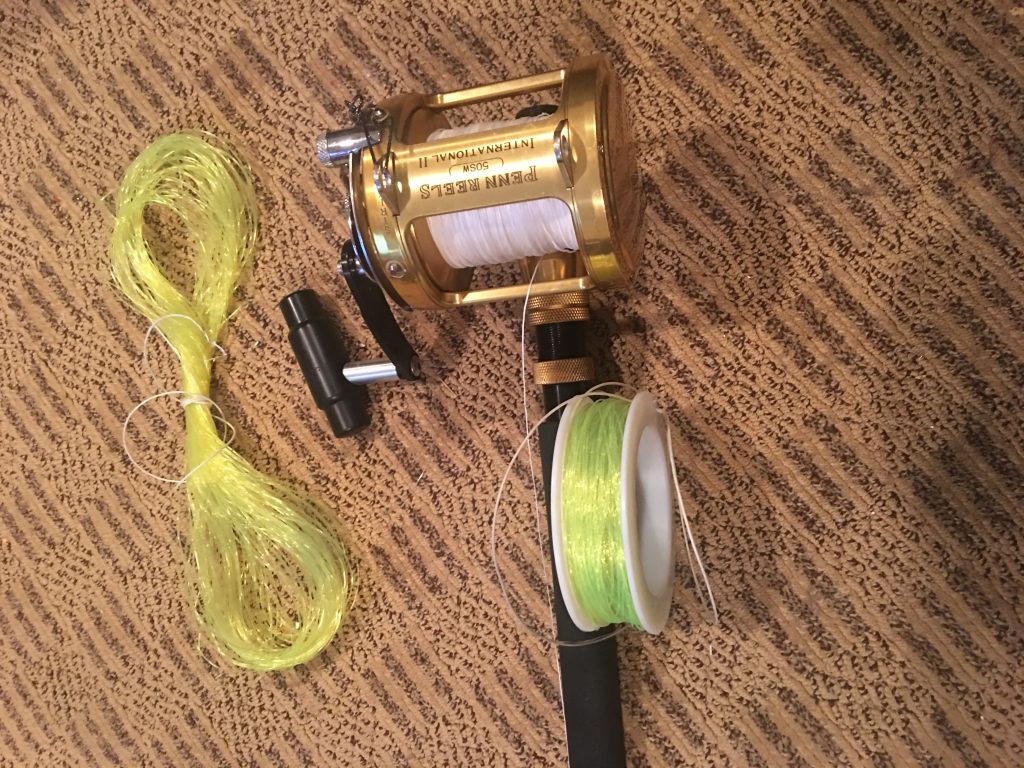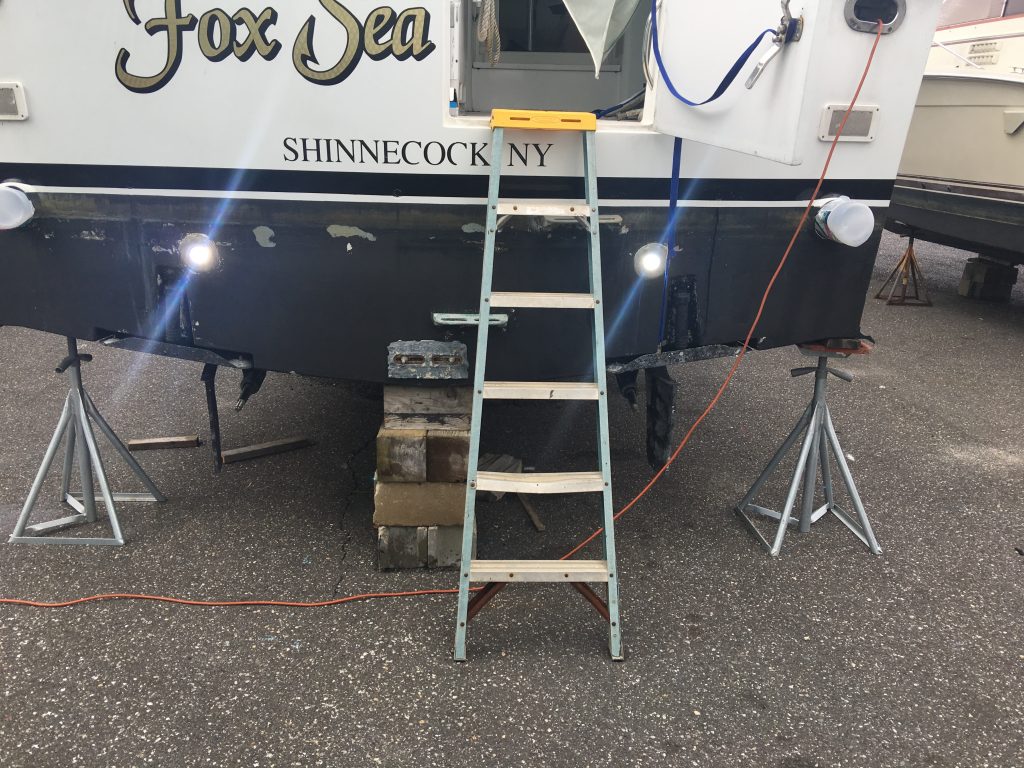
Before you know it we will be tearing off the shrink-wrap on the boat and scheduling launch dates. Now is the time to not only get your boat ready but a great time to take care of your tackle. Don’t wait until the last minute! Especially if you require professional service. Service professionals will start to get backlogged and if you wait too long you may miss the season opener.
For your boat make 2 lists of things that need to be done;
The first a list of items that must be or are preferred to be done on land. Items like bottom paint, thru-hull fitting maintenance, or replacement. Also, waxing the hull up to the rub rail. Electronics that include underwater sensors, lights, and transducers. Make sure speed paddle wheels are free and moving, as they should. If your boat is equipped with strainers or screens now is the time to ensure they are free of debris and water can flow thru as needed.

My boat has shafts and rudders; it’s a good idea to double-check their alignment. If you had no issues like cavitation etc. before last season’s end, you should be good to go. However, giving this gear the once over for visual inspection is easy and warranted. Spin the props while shining a light on the cutlass bearings. Does it spin freely and with even pressure? If you notice high spots (sticky areas) you either have a misaligned shaft or an old cutlass bearing that may be causing the bad alignment. Either way, take care of this now! A good yard mechanic can inspect and decipher if your shaft is bent. Usually, it’s just the bearing and possibly an engine alignment issue. Either way, if you wait until spring you may not be ready in time for Memorial Day, why chance it. This is also the time to check your props for knicks, bends, or anything that looks out of whack. It’s good practice to have your props serviced at regular intervals regardless of how they look. Just don’t procrastinate.
Do you save antifreeze when possible? Some systems allow for easy collection with an air compressor. Good for the environment and the pocketbook. This is easier to do on land as you can access thru-hull fittings as blow-out points and collect the antifreeze into buckets.

The second list may include engine maintenance, filter and or oil changes, etc. These are better to do in the water, as it’s important to bring the engine up to operating temperatures during this process. This makes the oil more viscous which in turn allows it to be pumped from the motor easily and more complete. Allowing the oil to move around the engine ensures it gabs particles and contaminants from all areas of the motor. When it comes to fuel filters especially on diesel motors it is good practice to change these while the boat is in the water. Once replaced and the air is purged from the fuel system you can start the boat and allow it to idle to ensure that a good prime has been achieved.
Cleaning and waxing the topsides is also a job that can be done while in the water. Metal maintenance often overlooked but essential to add longevity and ensure aluminum and other metals do not pit. A good metal cleaner should be used to remove all contaminants. Once dry there are several waxes, polishes, and oils to choose from. “Dealers choice” here, but just make sure you apply some type of protection as original coatings fade over time and chalky pitting appearances happen quickly to unprotected metals. Old Salty dog trick is to use transmission fluid and a rag. Thin-oil, like transmission fluid, is easily absorbed into the pores. Once it sets up a metal wax, like “Woodys” wax or Fitz, is a great way to encapsulate the oil and further protect the metal.
The main reason for developing 2 lists is to get an early launch date. It’s much better to get the yard work and launch done as soon as possible and have it behind you. That gets you ahead of the spring bottlenecks. Not to mention the marina staff will love you. Two other factors make me rush to launch each season. The first is my work to time ratio. There is nothing worse than running down to the marina to do work and spending half the day talking to your summer friends and boat neighbors that you have missed. Everyone wants to talk and no work gets done. If you’re one of the first boats in you are away from the temptation to gab, and can regulate and manage your time better. The second is that inevitably there will be some pre-summer days that are just absolutely gorgeous. You can take a shakedown cruise, have a beer in the slip, whatever the doctor orders, you have options to enjoy the day. Not to mention getting your shakedown cruise done early is also important. God forbid, you discover a new issue that needs a mechanic or the yard’s attention. You may go to the back of the line.
If you’re a fisherman you have a whole other universe of gear that requires attention, maintenance, and sometimes replacement.
Rods:
You should inspect and correct any issues that may be apparent. When it comes to guides, sliding a cotton swab through a guide is an easy quick way to detect knicks. These knicks will shorten the life of your fishing line and will result in lost fish. Unfortunately, most of the time the only means to repair them is a replacement. I take my rods locally to Cow Harbor Bait and tackle. Marc has a fair price for his service and he builds custom rods, so his quality is great. Find a local shop that does the repairs on the premises. Not having them shipped out saves time and money. Roller guides should all be cleaned and lubricated. Using a larger than a normal piece of braided line is a great way to ensure they all spin and operate freely. Reel seats and collet nuts should be cleaned with “Salt Away”, dried and oiled. The reel needs to be removed to clean all the salt and sand that is trapped there. A lite coat of grease between the reel and the rod (especially if they are both made of metal) goes a long way in protecting and keeping the hardware operating and appearing like new.
Reels:
They should be considered as little mini engines. Their oil needs to be changed annually. Oil and grease not only ensure easy fluid operation but are also a medium used to attract and hold contaminants. Consider grease as a filter. This filter should be replaced annually along with the salt, metal shavings, sand, and other particles that are trapped in it. At a minimum, every reel should be opened the grease whipped clean and replaced, and new oil introduced to all moving gears and bearings. If you are not handy or intimidated to open a reel, get them to a tackle center that provides this service. Attention also needs to be paid when it comes to drag and fishing line conditions. Peeling off some line with the drag engaged is a great way to check that it’s smooth and operates, as it should. This is also a great time to check the clicker. Tie the line off to a fence or tree. Walk away from it under pressure and pay attention to the feel and sound of the drag. Once satisfied that it’s fine back off the drag and continue walking. After 50 yards or so engage the reel and start cranking. Pinch the line between two fingers and feel for imperfections. If it’s compromised either cut some off or replace the entire spool of line.
Covid is still a concern and has resulted in the cancelation of seminars, shows, and tournaments. Don’t despair, there are many options still available. Search the Internet and local publications for virtual versions. If you cant find the topics that interest you search YouTube and tap into their treasure trove of how-to videos. Take notes, like, and support channels that you find useful and challenge yourself to learn something new (like knots, or throwing a cast net). Another great resource is your local tackle shop. Try to go on off hours and don’t be shy about asking questions. They are there to help you and the dollars you spend will go a long way in supporting local businesses.
Regulations:
Take the time to visit websites and learn the restriction and regulations of your area. When seasons open, close, and fish size limits. Go to https://www.dec.ny.gov/docs/fish_marine_pdf/fishlimitsfish.pdf.
Be prepared for new regulations; DEC proposes the use of circle hook for 2021 recreational striped bass fishing season. Public comment on the proposal is accepted through March 08, 2021. Circle hooks work in decreasing the mortality of released fish. Regardless of if this regulation passes, you should spend time learning and acquiring the proper tackle to take advantage of keeping fish stocks healthy and vibrant by using circle hooks.
The tuna fishing off Long Island was banner last season. Did you know that you need a vessel permit to fish for and retain highly migratory species such as tuna and sharks? Permit needs to be renewed annually. Go to https://hmspermits.noaa.gov/default.asp.
Get ahead of the curve and don’t procrastinate. The season here in the North East is short enough. Do whatever you can to extend it.
